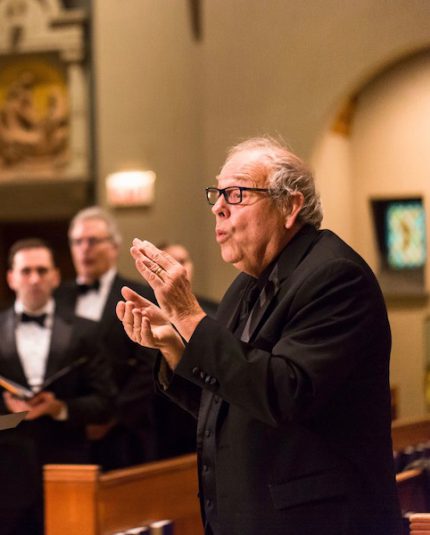Chicago Chorale soars in memorable night of Scandinavian music
If you’ve never heard of the Chicago Chorale, you need to change your Sunday plans and run down to Hyde Park Union Church to catch this afternoon’s matinee.
Now in its 18th season, the Chorale—under the direction of founder/artistic director Bruce Tammen—has grown into one of the most consistently excellent, if still relatively little known, of Chicago’s musical organizations. That this large chorus is able to attain such successful results in intensely demanding repertoire would be an achievement for a professional ensemble; the fact that the Chicago Chorale is made up entirely of amateur singers is simply astonishing.
The concert of music by Baltic and Scandinavian composers, presented Saturday night at Covenant Presbyterian Church in Bucktown, is characteristic of the kind of thoughtful, intelligent yet challenging programs that the Chicago Chorale has been presenting now for nearly two decades under Tammen’s leadership.
The evening’s main work was the Vespers of Einojuhani Rautavaara (1928-2016). The Finnish composer later combined this 1971 work with his Matins, written the following year, to form his Vigilia or, in its full title, “All-Night Vigil in Memory of St. John the Baptist.” But as the Chorale’s remarkable performance showed, the Vespers is fully capable of standing on its own, as originally conceived.
Written specifically for the decidedly odd “Festival of the Beheading of St. John the Baptist,” the Vespers is cast in 14 sections. Rautavaara stated that he wanted to get away from the traditional churchy consolation of more utilitarian brands of 20th-century sacred music. Towards that end, the composer hearkened back to the deep impression made on him by a childhood visit to the island monastery of Valamo.
That experience along with his individual approach here creates an extraordinary work, one of the most distinctive, idiosyncratic and technically demanding sacred choral works of the past half-century. While outwardly traditional in form and structure, Rautavaara appears to be going back to archaic Finnish Christian origins; the music is almost pagan-sounding in this collision of Christian worship and wildly contrasted dynamic and vocal effects.
The Vespers opens with a febrile tenor solo that sounded as idiomatically Finnish as the singing by the full chorus that steals in underneath the soloist.
There is a joyful audacity and love of extremes in Rautavaara’s writing, like a kid experimenting with a new toy. Nowhere is that more apparent than in the bass soloist’s music in Psalm 103 where soloist Daniel Fridley’s subterranean tones seemed to delve deep into Middle Earth with little seeming effort. Fridley was just as nimble in the latter cantorial sections where he related John’s fate, and the dizzyingly steep swoops up and down.
The daring freedom of the vocal writing is consistently striking, as the solo women’s voices leap higher and higher in the “First Katisma.” Yet there is also a sense of uninhibited spiritual joy in this score, as with the closing section of the “Troparion of the Feast” and the full chorus in the “Final Blessing.”
Apart from some hissy sibilants in the “Evening Hymn,” the 64-member Chorale was fully up to the intense technical demands of this music.—whether whispering, pleading in supplication or soaring with confidence, the singers brought remarkable vocal polish, expressive versatility and deep dedication to this performance. Tammen’s direction proved as faultless as ever— alert yet flexible, impeccably balancing sections and seeming to always find ideal tempos throughout.
The second part of the continuous 70-minute program offered a bracing sampler of five shorter works that showcased the rich variety of styles extent among choral music by contemporary composers of Baltic/Scandinavian origins.
Gunnar Eriksson’s arrangement of “Gjendines bådnlåtte” underlined the lullaby-like quality of this Norwegian folk song, as the women’s voices float the tender lullaby’s melody over the men’s three-note counterpoint on “bådnlåtte” (baby). Tammen led a performance that brought out the charm and delicacy of this song, with meticulous dynamic marking in the final section.
Sanctus: London by the Norwegian-American Ola Gjeilo offers strikingly rich harmonies, and the Chorale’s massed voices filled the church with warm, resplendent tone. The Latvian Peteris Vasks’ Pater Noster is wholly characteristic in its cool, Northern luminosity and, here too, the singers rose to an imposing tonal sumptuousness at the climax.
The most strikingly original of the shorter works was Tõnis Kaumann’s Ave Maria. The Estonian composer free-style writing is almost jazz-like in its improvisational solos; the Chorale members acquitted themselves with striking panache here, from a passage that suggests a muezzin-like call to prayer to the madrigal-like writing for women’s voices, which detach to soar heavenward.
Tammen’s scrupulous direction was manifest throughout the program, not least in the closing work, Arvo Pärt’s Nunc dimittis. From the terracing of entering voices, Tammen’s exacting yet flexible control traced the wide dynamic range of Pärt’s setting, from spare tintinnabulatory effects to a majestic peak and back down to a hushed, glowing spiritual solace.
The program will be repeated 3 p.m. Sunday at Hyde Park Union Church. chicagochorale.org
Posted in Performances






Posted Apr 02, 2019 at 4:44 pm by Madelon Albert
Delighted to read this wonderful review! It sounds incredibly creative and challenging. I only wish I could have been there! Any new recordings available or in the works? Keep me updated, please…
Again, congratulations from Ireland!